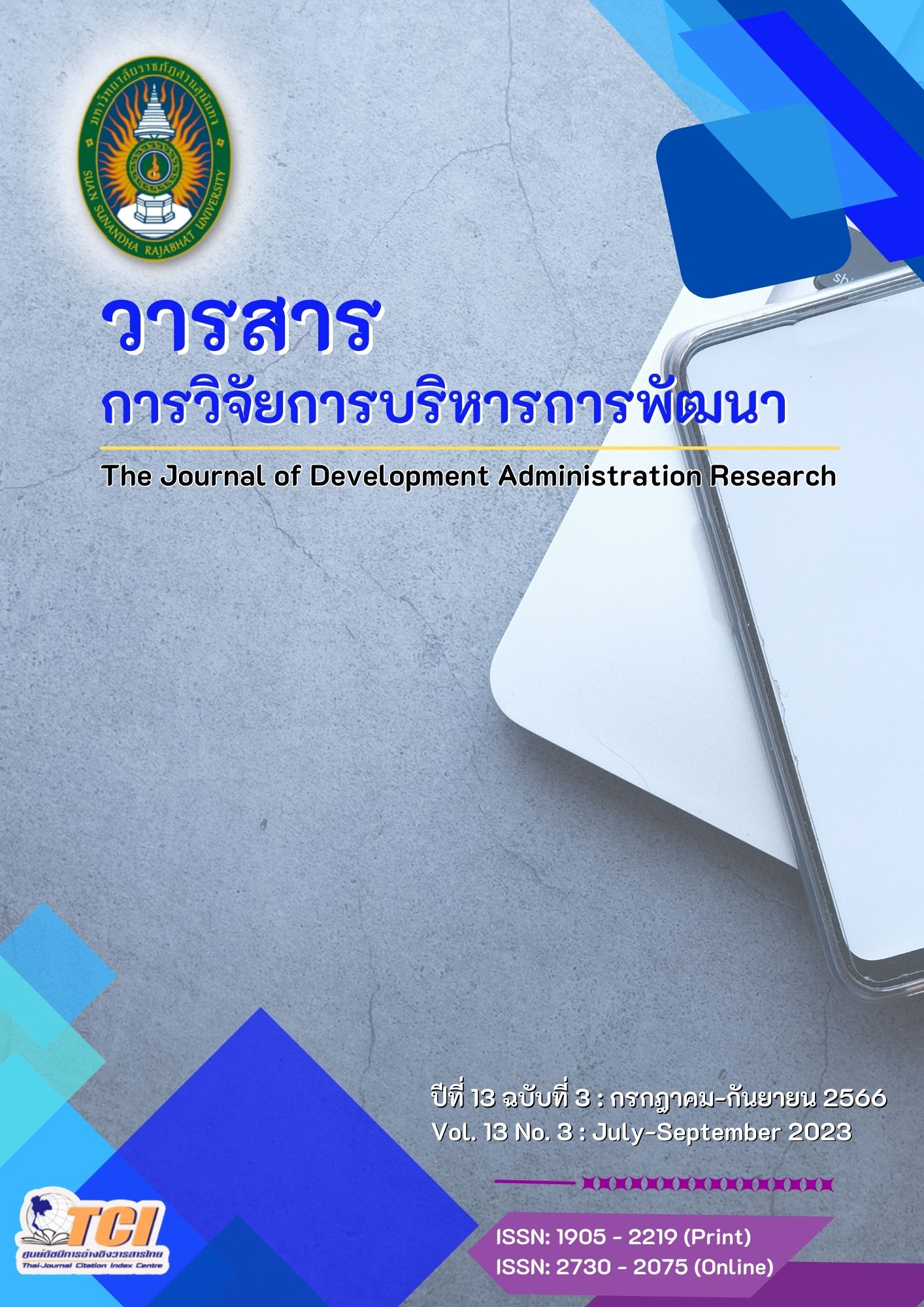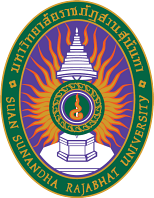ปัจจัยเชิงสาเหตุที่ส่งผลต่อสมรรถนะผู้นำทีม และผลการดำเนินงาน ของธุรกิจขายตรงในประเทศไทย
คำสำคัญ:
วัฒนธรรมองค์กร, ความสามารถทางนวัตกรรมระดับองค์กร, ความพึงพอใจในงาน, สมรรถนะผู้นำทีม, ผลการดำเนินงานของธุรกิจบทคัดย่อ
การศึกษาครั้งนี้มีวัตถุประสงค์เพื่อ 1) ศึกษาปัจจัยเชิงสาเหตุด้านวัฒนธรรมองค์กร และด้านความสามารถทางนวัตกรรมระดับองค์กรที่ส่งผลต่อความพึงพอใจในงานของธุรกิจขายตรงในประเทศไทย
2) ศึกษาปัจจัยเชิงสาเหตุด้านความสามารถทางนวัตกรรมระดับองค์กร และด้านความพึงพอใจ
ในงาน ที่ส่งผลต่อสมรรถนะผู้นำทีม ของธุรกิจขายตรงในประเทศไทย และ 3) ศึกษาปัจจัยเชิงสาเหตุด้านวัฒนธรรมองค์กร และด้านความพึงพอใจในงานที่ส่งผลต่อผลการดำเนินงานของธุรกิจขายตรง
ในประเทศไทย การวิจัยครั้งนี้เป็นการวิจัยเชิงผสม เครื่องมือที่ใช้เก็บรวบรวมข้อมูล ได้แก่ แบบสัมภาษณ์และแบบสอบถามออนไลน์ สถิติที่ใช้ในการวิเคราะห์ข้อมูล ได้แก่ เทคนิคสมการโครงสร้าง
ผลการวิจัยพบว่า 1) ปัจจัยเชิงสาเหตุด้านวัฒนธรรมองค์กรมีอิทธิพลทางตรงเชิงบวกต่อความพึงพอใจในงานของธุรกิจขายตรง 2) ปัจจัยเชิงสาเหตุด้านความสามารถทางนวัตกรรมระดับองค์กรมีอิทธิพลทางตรงเชิงบวกต่อความพึงพอใจในงานของธุรกิจ และ 3) ปัจจัยเชิงสาเหตุด้านความพึงพอใจในงานมีอิทธิพลทางตรงเชิงบวกต่อผลการดำเนินงานของธุรกิจ ดังนั้น สมาชิกในองค์การทุกระดับ หรือหน่วยงานที่เกี่ยวข้องควรเพิ่มทักษะด้านนวัตกรรม และจัดกิจกรรมเพื่อเสริมสร้างวัฒนธรรมที่เข้มแข็งอย่างยั่งยืนให้กับสมาชิกในองค์การ เพื่อเพิ่มคุณค่าในผลการดำเนินงานขององค์การให้มากขึ้น และยังจะเป็นการสร้างความได้เปรียบทางการแข็งขันอย่างยั่งยืนในอนาคตต่อไป
เอกสารอ้างอิง
Beuren, I. M., Souza, V. S., & Theiss, V. (2021). Organizational resilience, job satisfaction and operating results. International Journal of Productivity and Performance Management, 71(6), 2262-2279.
Chanasreuk, S. (2011). Employee satisfaction towards working in Kalasin Starch Co., Ltd. (Master’s Thesis). Rajamangala University of Technology Isan.
Chuawongprom, Y. (2020). Influence of strategic leadership and organizational culture on the efficiency of the local administration organizations in Mueang Sakon Nakhon District, Sakon Nakhon Province (Master’s Thesis). Sakon Nakhon Rajabhat University.
Chucharoenphiphat, N. (2012). Organizational culture affecting employees’ work performance of Siam Commercial Bank in Nakhonsawan (Master’s Thesis). Rajamangala University of Technology Thanyaburi.
Dosi, G. (1982).Technological paradigms and technological trajectories: A suggested interpretation of the determinants and directions of technical change. Research Policy, 11(3), 147-162.
El-Sisi, S. A., & Montaser, N. M. (2023). Impact of servant leadership on job performance: Mediating role of innovation and job satisfaction applied to travel agencies in Egypt. International Journal of Tourism Archaeology and Hospitality, 2(3), 201-2016.
Harkema, S.J.M., & Browaeys, M.J. (2002). Managing innovation successfully: A Complex Process. In European Academy of Management Annual Conference Proceedings, EURAM 2002, Brussels.
Heo, M. S., & Yoon, S. Y. (2009). Study on corporate culture & job satisfaction of airlines' flight attendants. The Journal of Advanced Navigation Technology, 13(1). 1-10.
Ing Wu, S., & Lung Lu, C. (2012). The Relationship between CRM, RM, and operating results: A Study of the Hotel industry in Taiwan. International Journal of Hospitality Management, 31, 276–285.
Jaskyte, K., & Dressler, W.W. (2005). Organizational culture and innovation in nonprofit human service organizations. Administration in Social Work, 29, 23-41.
Jedaman, P., Kenaphoom, S., and Udompan, A. (2022). Transcendental leadership in leader’s strategies management under the 21st century dynamics era. Interdisciplinary Academic and Research Journal, 2(3), 27-44.
Koonlabood, C. (2008). Customers' satisfaction toward services of bank for agriculture and agricultural cooperatives, Muang District, Ubonratchathani Province (Master’s Thesis). Ramkhamhaeng University.
Kuean, S.K., & Wong, E.S.K. (2010). Employees' turnover intention to leave: The Malaysian contexts. Journal of Applied Sciences, 10(19), 2251-2260.
Kwanmuang, S. (2016). The relationship of transformational leadership that affects job satisfaction and organizational commitment of Bangkok Government Officer (Master’s Thesis). Thammasat University.
Luangsakdapich, R. (2020). Innovation capability in providing services and performance in providing services, evidence from the hotel business in Thailand. Chulalongkorn Business Review, 42(1), 43-67.
Gul, W., Masood, K., Sadiq, I., & Saeed, B. (2022). Examining the impact of leadership competencies on the performance of projects, the mediating effect of job satisfaction. Sustainable Business and Society in Emerging Economies, 4(1), 97-114.
McGraw-Hill, G. N. (2007). A Study of Job Satisfaction of Srinakharinwirot University Employees (Master’s Thesis). Srinakharinwirot University.
Moon, S., Bermudez, J., & Hoen, E. (2012). Innovation and access to medicines for neglected populations: Could a treaty address a broken pharmaceutical R&D system?. PLoS Med, 9(5), e1001218.
Numsang, P. (2013). Effects of organizational culture, attitudes and work environment on performance effectiveness of employees at the operational level in the ploenchit and sukhumvit districts (Master’s Thesis). Bangkok University.
Phanlapha, C. (2017).Organizational Culture Affecting Core Competencies of Personnel. Institute of Molecular Biosciences, Mahidol University. Mahidol R2R E-Journal, 4(2), 206-116.
Poolpetch, T., Chesadalak, V., & Saensuk, J. (2018). Innovative cultural construction of organization: Antecedents and consequences. Faculty of Applied Arts, 11(2), 127-141.
Porsila, N., & Wirunhaphon, S. (2015). A causal model of operating results of direct sales. Business Administration Journal Economics and Communication, 10(1), 62-74.
Potipanya, K. (2016). Innovation capability affecting organization success to development of an accounting firm model in Thailand for the ASEAN Economic Community (Master’s Thesis). Rajamangala University of Technology Thanyaburi.
Pulpetch, T., Jadesadalug, V., & Sansook, J. (2018). Innovative cultural construction of organization: Antecedents and consequences. The Journal of Faculty of Applied Arts, 11(2), 127-141.
Raithel, K., Knippenberg, D. V., & Stam, D. (n.d.). Team leadership and team cultural diversity: The moderating effects of leader cultural background and leader team tenure. Journal of Leadership & Organizational Studies, 28(1), 261-272.
Rajapathirana, R.P.J., & Hui, Y. (2018). Relationship between Innovation capability, innovation type, and firm performance. Journal of Innovation & Knowledge, 3, 44–55.
Ronphairin, R. (2018). Job satisfaction of employees of Krungthai Bank Public Company Limited Aranyaprathet Branch, Sakaeo Province (Master’s Thesis). Burapha University.
Ruppel, C.P. and Harrington, S.J. (2000) The relationship of communication, ethical work climate, and trust to commitment and innovation. Journal of Business Ethics, 25, 313-328.
Saekow, T. (2014). Organizational factors affecting innovation behavior in operations to support ASEAN economy of meat processing ndustry in Bangkok Metropolitan Region (Master’s Thesis). Bangkok University.
Songsom, A. (2018). Causal factors of electronic loyalty purchase case study from the online store of the Generation Consumer Group. Veridian E-Journal, 11(1), 1972-1986.
Songsom, A. (2019). Effects of innovativeness on competitive advantage of small and medium enterprises (SMEs) in Songkhla Province. Veridian E-Journal, Silpakorn University Humanities, Social Sciences, and Arts, 12(3), 821-835.
Suwanko, P. (2014). The influence of organizational culture. and reformed leadership that affect resource management competencies strategic person of the National Cancer Institute. Journal of Academic Resources, Prince of Songkla University, 25(3), 21-31.
Tichi, N. M., & Cohan, M. (2007). The transformational leader. Training and Development Journal, 40(7), 35-40.
Vanichbuncha, K. (2019). Statistical analysis: Statistics for administration and research (9th ed.). Bangkok: Chulalongkorn University.
Wijaya, N. S., & Rahmayanti, P. L. (2023). The role of innovation capability in mediation of COVID-19 risk perception and entrepreneurship orientation to operating results. Uncertain Supply Chain Management, 11(1), 227-236.
ดาวน์โหลด
เผยแพร่แล้ว
รูปแบบการอ้างอิง
ฉบับ
ประเภทบทความ
สัญญาอนุญาต
ลิขสิทธิ์ (c) 2023 วารสารการวิจัยการบริหารการพัฒนา

อนุญาตภายใต้เงื่อนไข Creative Commons Attribution-NonCommercial-NoDerivatives 4.0 International License.
บทความที่ได้รับการตีพิมพ์เป็นลิขสิทธิ์ของมหาวิทยาลัยราชภัฏสวนสุนันทา
ข้อความที่ปรากฏในบทความแต่ละเรื่องในวารสารวิชาการเล่มนี้เป็นความคิดเห็นส่วนตัวของผู้เขียนแต่ละท่านไม่เกี่ยวข้องกับมหาวิทยาลัยราชภัฏสวนสุนันทา และคณาจารย์ท่านอื่นๆ ในมหาวิทยาลัยฯ แต่อย่างใด ความรับผิดชอบองค์ประกอบทั้งหมดของบทความแต่ละเรื่องเป็นของผู้เขียนแต่ละท่าน หากมีความผิดพลาดใดๆ ผู้เขียนแต่ละท่านจะรับผิดชอบบทความของตนเองแต่ผู้เดียว




